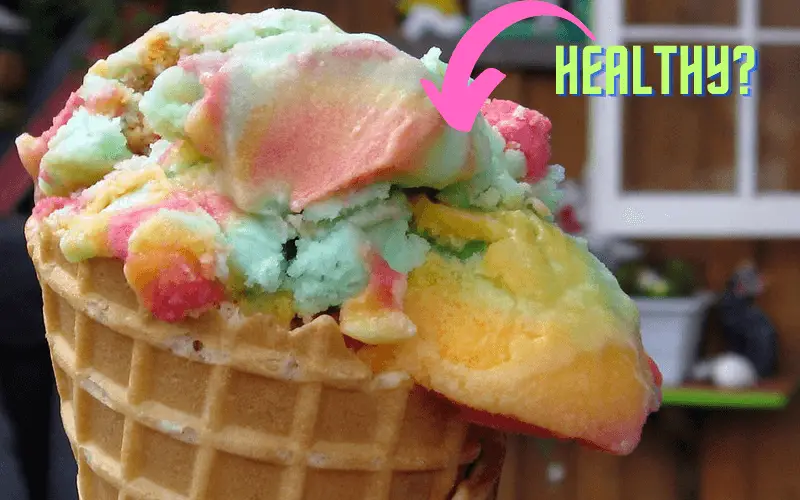In this article, we discuss the nutrition and ingredients of sherbet to help you understand if it is a healthy food. By end, you’ll be able to make a mindful decision about whether this dessert is right for you. Let’s get into the details!
Sherbet: Healthy or Unhealthy
Below you will find the key factors to consider when evaluating the healthiness of sherbet such as calories, fat, sugar, and ingredients. By understanding these factors, you’ll be better able to determine if this classic dessert fits into your diet.
Calories
A 2/3 cup serving of sherbet has around 150-160 calories. This is certainly relatively tame for a dessert if you stay within the serving size.
However, calories don’t tell the whole story of a food in regard to health. For example, 150 calories of sherbet is much different than 150 calories of carrots.
The recommended amount of calories consumed per day can vary greatly from person to person. Factors such as age, sex, and lifestyle factor into an person’s recommended calorie intake.
Generally, women are recommended to consume 2,000 calories and men 2,500 calories per day. That being said, a serving size of sherbet isn’t going to ruin the day if you’re careful about what you eat throughout the day and stay within your recommended calories.
Fat
Generally, sherbet does not contain a lot of fat. Your standard fruit-flavored sherbet has roughly 1-2 grams of total fat and around 1 gram of saturated fat with no trans fat.
The Dietary Guideline for Americans 2020-2025, indicate that no more than 20 to 35% of calories should come from fat while saturated fat should be less than 10% of calories for the average American (source).
If you are following these recommendations on a 2,000 calorie diet, as an example, you could consume roughly 44 to 78 grams of total fat and up to about 28 grams of saturated fat in a day.
In summary, the fat in sherbet is low and is not a concern for most people who are generally living healthy lifestyles.
Cholesterol
The cholesterol in sherbet is minimal at about 5 to 10 milligrams per 2/3 cup serving. To put this into perspective, The University of California San Francisco Health recommends a maximum of 300 milligrams per day for individuals without risk factors for heart disease and 200 milligrams for people with these risk factors.
The cholesterol in sherbet is low and not a concern for most people who keep their cholesterol in check.
Sodium
Most Americans consume way too much sodium. According to the Mayo Clinic, Americans, on average, consume about 3,400 milligrams of sodium per day. However, many health experts recommend a maximum of 2,300 milligrams daily, which is about a teaspoon of table salt.
Most sherbet products have less than 75 milligrams of sodium per serving. Since sherbet generally has 5% daily value or less of sodium per serving, it is considered a low sodium food.
Total Carbohydrates
The Dietary Guidelines for Americans recommends that up to 45% to 65% of total daily calories come from carbohydrates. That translates into 225 and 325 grams daily on a 2,000 calorie diet (source).
A 2/3 cup serving of sherbet has somewhere between 30 to 40 grams of carbs, on average. You should be cautious about how much sherbet you consume given it is not low carb. This is especially true if you’re following a low carb diet as is the trend for many people today.
Sugars
The Dietary Guidelines for Americans provides only a recommendation for added sugars and not total sugars. They recommend less than 10% per day of calories from added sugars. That is a maximum of 48 grams of added sugar on a 2,000 calorie diet.
The American Heart Association has an even stricter recommendation at 24 grams for women and 36 grams for men per day of added sugar (source).
The added sugar in sherbet varies but its generally around 25 grams per serving. The amount of sugar in sherbet is one of the main factors of why sherbet is unhealthy.
Protein
Sherbet has about a gram of protein from the milk or other dairy used to make it. This classic dessert is not a good option for protein.
Vitamins & Minerals
Sherbet is not a good source of vitamins and minerals. You’ll get roughly 2 to 4% of your daily value in calcium from a serving of sherbet. There are no other noteworthy vitamins and mineral of significance that will do the body good.
Ingredients
As we previously indicated, sherbet has a decent amount of added sugar in it. However, its not just sweetened with sugar but also often with corn syrup and high-fructose corn syrup. These ingredients can be unhealthy when consumed in excess.
Furthermore, the bright colors found in sherbet are often derived from artificial colors. Some of these dyes are believed to cause hyperactivity in children and allergies, among other potential issues, based on studies.
Keep in mind that sherbet is a dairy product which may be a factor for some people with dairy restrictions.
Summary
While sherbet can be enjoyed in moderation, it is not the healthiest food option due to its relatively high carbohydrate and added sugar content. It also lacks significant amounts of vitamins, minerals, and protein.
Additionally, ingredients like sugar, high-fructose corn syrup, preservatives, and, artificial colorings only add to the unhealthy factor of this dessert.
People should be mindful of their overall diet and consume sherbet in moderation as part of a balanced and nutritious eating plan. Sherbet is certainly unhealthy but it is much better than countless other desserts available at grocery stores.
In closing, be sure to read the nutrition facts and ingredients of any sherbet since not all are created equal. The label information will offer the best picture of what is in a specific product.
Image Credit – Ruth Hartnup/flickr

